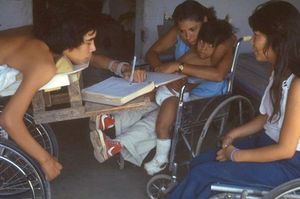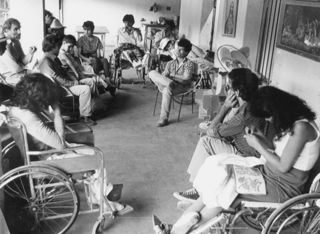Hesperian Health Guides
Chapter 50: Organization, Management, and Financing of a Village Rehabilitation Program
HealthWiki > Disabled Village Children > Chapter 50: Organization, Management, and Financing of a Village Rehabilitation Program
Organization and management — a people-centered approach
In Chapter 45 we spoke of different approaches to a community program. Programs that are bottom-up, or begun by people with disabilities, family members, and concerned members of the community tend to be organized and managed very differently than top-down programs.

A sense of equality among all persons taking part in or benefiting from the program is basic to the organization of bottom-up or people-centered programs:
- Everyone is considered equal.
- Leaders are coordinators, not bosses.
- Decisions are either made by the group or can be openly challenged by the group or by any of its members.
 |
| THE SMILE FACTOR — perhaps the best measurement of a program’s success. (Photo: UNICEF/T.S. Satyan) |
- Everyone has the same rights and deserves the same respect. The ideas and opinions of children with disabilities and their families are just as important as those of the village rehabilitation worker or visiting professional. All are equal and valuable members of the rehabilitation team.
In a people-centered program, goodwill, friendliness, and a feeling of shared pleasure in meeting each other’s needs are often given more importance than polished floors, arriving on time, exact records, number of hours worked, or how many wheelchairs are produced by each worker each month. Success of the program is measured not so much by formal evaluation as by the “smile factor”: how good everyone— workers, parents, and children— feels about what they have put into and received from the interaction.
The PROJIMO approach: Informal organization and team management
We who work at PROJIMO are in no position to speak with authority about organization and management. Sometimes we wonder if our achievements are due more to our disorganization. Whatever organization and management we have is informal and more or less cooperative. Not only are there no clear-cut divisions between managers and workers, but even the division between workers and patients is unclear. (In fact, we avoid words like “patient” and “client.”) Parents, children, visitors, and everyone else are invited and expected to help out in whatever way they can. Most members of the PROJIMO team are young people with disabilities who first came for rehabilitation or aids. They began to help out as best they could, and finally decided to stay to learn and work. Some stay a few weeks or months, learn new skills, gain confidence, and then go on to something else. Others stay for years. Some come and go, and return again.
PROJIMO is like a big family, mainly of young people, growing up together. Most of the work team is made up of young persons who are themselves benefiting from rehabilitation, learning to work, and learning to relate to each other. It would be a mistake to use the same goals and measure of “production efficiency” as you would for a shop that employs already trained and experienced workers. There is no boss to give orders. Yet the needs of the children with disabilities place a demand on the group to work relatively hard, and to accomplish what they can. Hours are flexible. There are quiet afternoons where half the workers suddenly decide to go swimming in the river. And there are busy days when several team members work until midnight to finish a brace or limb or wheelchair for a family that needs to return home on the morning bus. They choose to work overtime, not because someone tells them to, or because they get extra pay, but because a child’s father explains that he cannot afford to miss another day’s work or a mother is worried about a sick child she left at home.

When a situation arises that will require extra work and responsibility, the group as a whole decides if they think they can handle it. For example, one time a teenage boy named Julio arrived; as a person with quadriplegia, Julio had almost no movement in his limbs. Today Julio is one of the leaders of PROJIMO. He had severe pressure sores, and was totally dependent for all his daily needs. The team, which had no one specially trained in nursing care, met and discussed whether they could accept Julio in PROJIMO, since no family member was prepared to stay with him. Some argued against accepting him. Others argued in favor, pointing out that his home situation was miserable. (His stepfather resented his mother spending time with the boy.) At last the majority decided to accept Julio, even though a few team members said that they would not be willing to help in his care. It turned out, however, that some of those who had at first been unwilling became those who spent the most time with Julio. Not only did the group do an excellent job in healing his pressure sores and tending his personal needs, they became his close friends.
The team invited Julio to take part in evaluating the needs of other children with disabilities, so that he could learn history-taking and advisory skills. They also gave him the job of chief “work checker.” His job was to keep a list of the various jobs that needed to be done each day and who was responsible for doing them. He would check to see that the jobs were getting done and speak to those who needed reminding. Since he could not get around easily the group agreed that when Julio asked anyone to send someone to him, they would do so. Thus Julio, as the team member with the most severe disabilities, was given the most power in terms of program management. This is in agreement with the politics of the program, that only through a just redistribution of power will the most marginalized gain a more fair place and voice in our society.
The fact that PROJIMO has no “boss” creates certain problems while it avoids others. Individual concern, group pressure, children’s urgent needs, and parents’ appreciation are the main motivations to do a good job. Some team members work much harder than others. When someone is not working enough or other problems arise (such as rudeness to families), the group meets with the person. In extreme cases the person may be asked to meet the group’s expectations or to leave. So far however, those who have left have done so by their own choice.
Different team members are able to work at different speeds and effectiveness, depending on their disabilities. Therefore, the group judges a person’s work not by how much he produces, but by whether or not he is doing the best he can. A person who works responsibly gets higher pay, even if unable to work fast. Within the limitations of money available, the group decides how much different team members will receive. New team members who are learning work habits and skills begin as volunteers, with only their room and food paid. Later, they earn more, depending on how responsibly and steadily they work. The group decides.
 |
| Members of the PROJIMO team at a weekly meeting. |
The team meets regularly to plan activities and to decide who will take responsibility for what jobs. Different persons take charge of different aspects of the program: consultations, record keeping, accounting and different shop activities, such as aids making or wheelchair making. Playground maintenance, housekeeping, cooking and clean-up are usually done by turns. One person keeps track of the hours worked each day by different participants and this is used as a guide for monthly wages.
This whole organizational approach is informal and loosely structured. It is a process of ongoing experimentation and change. In short, a group of people are learning how to work and live together as equals. Sometimes things seem to work out better than others. It is the adventure of it all that keeps everyone going — the challenge to create a friendlier and fairer social order, if at first within only a small group.


